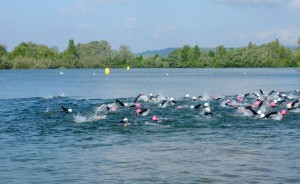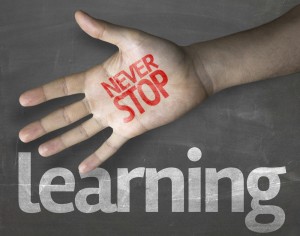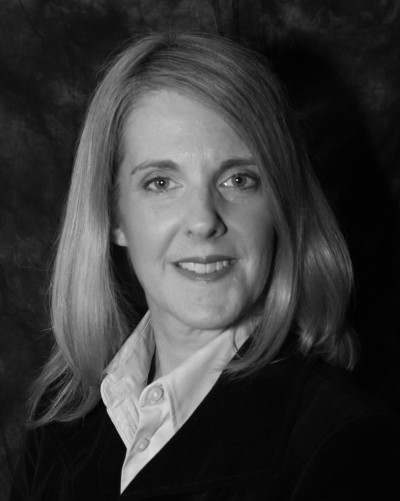I titled this blog post not to try and get your attention, well, all right, partly to get your attention, but really because I have been struggling with the swim leg of a triathlon. Floundering is perhaps more accurate description. At the same time, I became enthralled with the possibilities of formative assessment. Later you will see how I linked the two.
 For my first triathlon, actually my only triathlon, I swam with a snorkel. Yes, you are allowed to do so, however you can not win. Being the disciplined athlete I am I was unencumbered by this restriction as I wheezed around the course.
For my first triathlon, actually my only triathlon, I swam with a snorkel. Yes, you are allowed to do so, however you can not win. Being the disciplined athlete I am I was unencumbered by this restriction as I wheezed around the course.
Another indignity; triathlons start in waves. The Elites begin first and, as field thins and the triathletes thicken, the older folk start last. You may be surprised to learn that I am neither an Elite triathlete, nor extremely youthful. Consequently I started from behind and fought to maintain this stellar ranking.
There is another indignity in a triathlon. They write your age on your leg. This does not worry me, I saw it more as an explanation of my performance. However, it is embarrassing to be passed on the run, by a pair of calves boldly emblazoned with the number 74!
To be honest I finished about midway between the Elites and the DNF’s. (Did Not Finish). I wanted to do another tri, faster and sans snorkel. Enter formative assessment, if it works for kids, it should work for me, and hopefully before I am 74. Formative assessment could help, it was unlikely to harm my performance, what did I have to lose?
The Theory
Let me clarify what I mean by formative assessment. From my understanding, it is a planned process where one assesses where the learner is in terms of learning (triathlon swimming in this instance). Based on the assessment/s, the instruction continues as is or is modified.
There are three questions that focus the formative assessment process:
1.Where are you going?
2. Where are you now?
3. What do you do to close the gap?
And then there is evidence that the learner (me) is making progress toward the goal.
There is also feedback. which, since I am too tight to pay for a coach, I am going to provide that feedback to myself. This brings to mind a quote from Abraham Lincoln: “He who represents himself has a fool for a client.” A bird-walk but you may see the relevance.
The Practice
 Swimming is challenging for me. If the swim leg of a sprint triathlon was 50 yards, I would be fine, but it is not. It is 1/2 mile, which is a long, long way for me. The ride and the run are OK; note I did not say easy, or enjoyable.
Swimming is challenging for me. If the swim leg of a sprint triathlon was 50 yards, I would be fine, but it is not. It is 1/2 mile, which is a long, long way for me. The ride and the run are OK; note I did not say easy, or enjoyable.
Back to the swim.
I have purchased flippers, snorkel, goggles, hand paddles, and even a clicky belt thing that gives feedback (with an annoying click) when you roll your hips. (I do like my toys). I have read books, studied videos, and crawled the web for tips and insight. I have had lessons, (see I am not that tight), and I have practiced in a pool and in a lake.
I practiced body rolling, arm strokes, getting my butt up, and bi-lateral breathing. I am better than I was. (I once read a T-shirt that said, “The older I get, the better I was.” I agree with the sentiment, but digress.)
So why am I not much, much better at swimming by now?
Formative Assessment Insights
Here is what I am learning, thanks to formative assessment insights:
1. I do reflect on my swimming skills ( I use the latter term rather loosely!).
2. I found I check how I am going quite regularly. I even make a mental note of my performance. In most cases, I think I should do a little more of this, say breathing, and a little less of that, say sinking.
3. I do understand the learning progressions needed to swim that distance.
4. I have clarified my learning intentions.
However, I think I need to look more deeply (an unintended pun).
Dylan Wiliam proposed five strategies for formative assessment:
1. Clarifying, sharing, and understanding learning intentions and criteria for success.
2. Engineering and eliciting effective evidence of learning.
3. Providing feedback that moves learning forward.
4. Activating learners as instructional resources for one another.
5. Activating learners as owners of their own learning.
OK, I’ve got #1 and #5. For me, #4 is hard ‘cause it is just me. So that leaves #2 and #3.
I do get some evidence courtesy of an expensive, and thankfully waterproof, Garmin watch. I can tell lap times, distance, and stroke rate. But … so what?
This evidence is also feedback, but it is limited and after the fact. I have to download it on the computer to get it. What I need is in the moment feedback. I know I could pay for this, but we have been here before. I am too cheap, so let’s move on. I still need feedback.
Interestingly, I just realized the pool gives me feedback, like when I swallow water instead of breathing air, which does make me think about the quality of feedback.
I am highly motivated. I have found that the possibility of drowning is great motivation, but I am hesitant to recommend it as an educational strategy.
What I am beginning to see is that if I address the three focus questions of formative assessment:
1. Where am I going?
2. Where am I now?
3. How do I close the gap?
It is evident that it is quality feedback that moves me forward, that links #1 and #2 to achieve #3. It is the ability to provide quality feedback, in the moment, based on evidence, that is most helpful.
What have I learned?
Well, I think Wiliam’s Five Strategies help me think about learning, be it for triathlons or teaching literacy. The three focus questions are pivotal to implementing the strategies.
Once the direction is known, then it is time to determine what sort of evidence is needed to ascertain progress towards the destination and when each piece of evidence is relevant. Evidence and feedback often appear related at this point.
For example, the number of strokes it takes to get to the end of the pool is useful to know. However, feedback on form while actually swimming with the form of a sunken log, is far more helpful. Effective feedback is what is needed, at that moment, to move me forward (not downward). It is the immediacy of the adjustment which underscores a central tenet of formative assessment: formative assessment changes the learning while it is still malleable. James Popham‘s definition of formative assessment is: “Formative assessment is a planned process in which teachers or students use assessment-based evidence to adjust what they’re currently doing.”
 Effective feedback, grounded in where the learner is in the moment, is critical. It would be helpful, though not always essential, to have feedback from peers and/or a more knowledgeable other. However, in the end, it is the learner’s (my) responsibility for success. Interestingly, this raises the issue of goal setting, which is something for another day.
Effective feedback, grounded in where the learner is in the moment, is critical. It would be helpful, though not always essential, to have feedback from peers and/or a more knowledgeable other. However, in the end, it is the learner’s (my) responsibility for success. Interestingly, this raises the issue of goal setting, which is something for another day.
In the end, Wiliam’s Five Formative Assessment Strategies embedded in the three Formative Assessment Questions, provide an effective learning framework that works as well for triathlons as literacy.
So to put this in a growth mindset, which is pivotal to formative assessment, I can’t swim 1/2 a mile comfortably, YET.
 Prior to coming to Oakland Schools in 2004, Les Howard worked as an independent consultant across the United States based in San Francisco. Les came to California in 1994 to help establish Reading Recovery in California. He has been an educator for almost 40 years, almost 20 years in Australia. During this time he has been an elementary teacher, assistant principal, and literacy consultant and district literacy coordinator. Les is also a trained Ontological Coach. He believes coaching is a powerful process that empowers educators. He loves being outdoors and loves bicycling hiking, paddling, triathlons and adventure races, and trying to tire out his border collie. He and his wife enjoy traveling and camping.
Prior to coming to Oakland Schools in 2004, Les Howard worked as an independent consultant across the United States based in San Francisco. Les came to California in 1994 to help establish Reading Recovery in California. He has been an educator for almost 40 years, almost 20 years in Australia. During this time he has been an elementary teacher, assistant principal, and literacy consultant and district literacy coordinator. Les is also a trained Ontological Coach. He believes coaching is a powerful process that empowers educators. He loves being outdoors and loves bicycling hiking, paddling, triathlons and adventure races, and trying to tire out his border collie. He and his wife enjoy traveling and camping.


 Susan Wilson-Golab joined Oakland Schools in 2010 following 22 years of in the field 6-12 experience across two different states and rural, suburban, and urban contexts. Her research and practice focus heavily on the evolving definition of literacy, developmental learning progressions, and formative assessment. At the district level, Susan has served as classroom teacher, Literacy Specialist, and ELA Curriculum Coordinator. These experiences and study helped Susan in her role as Project Leader for developing a
Susan Wilson-Golab joined Oakland Schools in 2010 following 22 years of in the field 6-12 experience across two different states and rural, suburban, and urban contexts. Her research and practice focus heavily on the evolving definition of literacy, developmental learning progressions, and formative assessment. At the district level, Susan has served as classroom teacher, Literacy Specialist, and ELA Curriculum Coordinator. These experiences and study helped Susan in her role as Project Leader for developing a